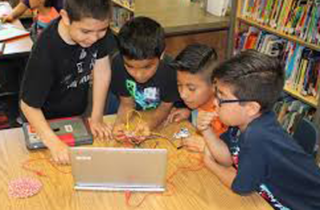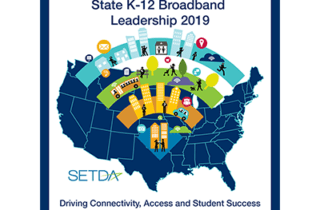According to Learning in the 21st Century: the 2019 Digital Promise LVP Survey, 83% of teachers think students are capable of high achievement, but just 26% think students are reaching those levels today. As part of the Learner Variability Project, which “seek[s] to uncover strategies to meet learners where they are across varied contexts and needs,” Digital Promise’s team is examining the key factors for different grades and subject levels that impact student learning. During the edWebinar, “Learning in the 21st Century: What Teachers Think Matters,” the presenters talked about the science of individuality, how they’re using the research to help developers create products to meet these individual needs, and examples that show how the Learner Variability Project can work in the classroom.
Technology has become an integral element in our students’ educational journey. With the influx of diverse and multimedia instruction technology software and 1:1 programs, students have access to technology both in and out of school settings. Laptops, Chromebooks, iPads, and even cell phones are providing students with opportunities to access the internet for researching, communicating and social learning. Classroom teachers are embracing the technology as a means to provide immediate feedback, assess student understanding and interact with both parents and students.
“What are you [teachers] doing right now so that your students have unhindered access to grade-level curriculum each day?” is a question often asked by Dana Blackaby, Dyslexia Specialist at The Academy at Nola Dunn in Texas. During a recent edWeb.net edWebinar, Blackaby and two student-led tech crew members from The Academy at Nola Dunn, 5th-grade student, Gavin, and 4th-grade student, Marley, explained that students with disabilities cannot access grade-level curricula 100% by themselves if they are not yet reading at grade level. Eighty-five percent of what we learn we learn is by listening and students can listen and comprehend two grade levels above their reading levels.
Accessible technologies help students with disabilities unlock their full potential by addressing a diversity of needs that include learning, visual, hearing, mobility, neurodiversity, and mental health. In a recent edWebinar, Lauren Pittman, Graduate Assistant at Vanderbilt University and former special education teacher; Beth Dudycha, Senior Manager of Content Development at Insight2Execution and former educator; and Mike Tholfsen, Principal Product Manager at Microsoft Education, brought to our attention that students with disabilities are not the only ones who benefit from accessibility learning tools.
edWeb.net is excited to announce that The State Educational Technology Directors Association (SETDA) will be sponsoring Professional Learning for Effective Practice: Leveraging Title IIA, a free professional learning community on edWeb that provides an online forum where district and state Title IIA leaders can learn about the effective implementation of the federal Title IIA program. The community will highlight program implementation best practices and share examples of evidence-based professional learning opportunities and exemplary professional learning programs at the state and district levels. Potential topics include evidence-based professional learning, creative use of monies, the coaching role, the do’s and don’ts of spending, and more.
If the workday of an adult typically requires seamless broadband access, then it’s reasonable that today’s students need the same access during their school day. After all, schools are preparing them for their future careers, which will include using some aspect of online technology. Recently, SETDA released State K-12 Broadband Leadership: Driving Connectivity, Access and Student Success, which looks at the current state of broadband access and how states are supporting teachers and students.
It’s almost impossible to ignore that K-12 classrooms in the U.S. are filled with students from increasingly diverse cultural backgrounds: race, nationality, religion, economic, etc. Many teachers, though, still aren’t sure how to move from recognizing the diversity to creating a mutually responsive learning environment. In his presentation, “Culturally Responsive Teaching: Key Principles and Practices,” Dr. Ken Springer, Professor of Education and Chair of the Department of Teaching and Learning at Southern Methodist University, explained why teachers should view diversity as an opportunity and what questions to ask to ensure they’re building a culturally inclusive classroom.
While the Individuals with Disabilities Education Act (IDEA) was last reauthorized in 2004, with amendments in 2015, and the Web Content Accessibility Guidelines (WCAG) were updated back in 2008, the demand for accessibility and equality in education continues to grow. Administrators and teachers, who want to help every child reach their potential, can’t afford to wait for new laws and policies. Educators still need to constantly evaluate the effectiveness of accessibility initiatives, advocate for resources for their students, and anticipate where they need to go next. During the edWebinar “Accessibility: Effective, Equitable Learning Environments for All Students,” which is part of a series hosted by CoSN and edWeb.net, the presenters discussed how they approach CoSN’s five steps to ensure accessibility.
Two common computer science misconceptions are that it’s just about programming and that only teachers with computer science degrees should teach it. Carrie Willis, Technology Director for Valley Preparatory School and Strategic Outreach Manager for Wonder Workshop, and Caitlin Arakawa, Kindergarten Teacher at Valley Preparatory School, dispel these misconceptions, during a recent edWebinar. They highlighted that soft skills critical to student success in future fields of study such as logic, problem-solving and creativity are integral components of computer science curriculums.
Teachers from previous decades may have focused on “What did I teach?” but the new focus is “What did the students learn?” Whether classroom resources are digital or not, educators can collect data every day to inform their instruction. In the presentation “Authentic Learning Starts with Informed Instruction” Michael Haggen, Chief Academic Officer at Scholastic Education, and Suzanne Lucas, Vice President of Product Marketing for Scholastic Education Digital Solutions, discussed how teachers can use formal and informal data to guide ELA lessons and make sure all students are receiving the education they need.











